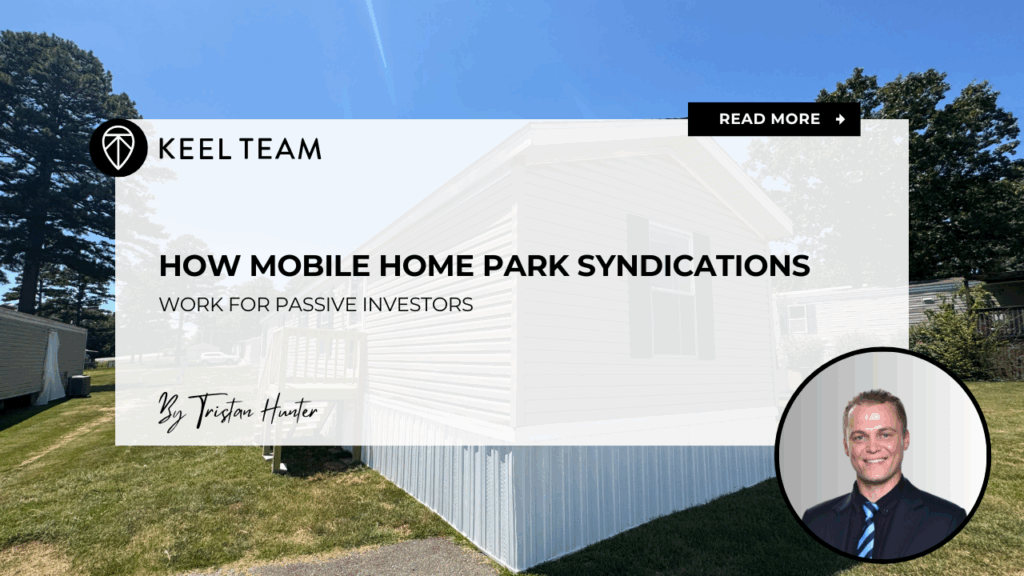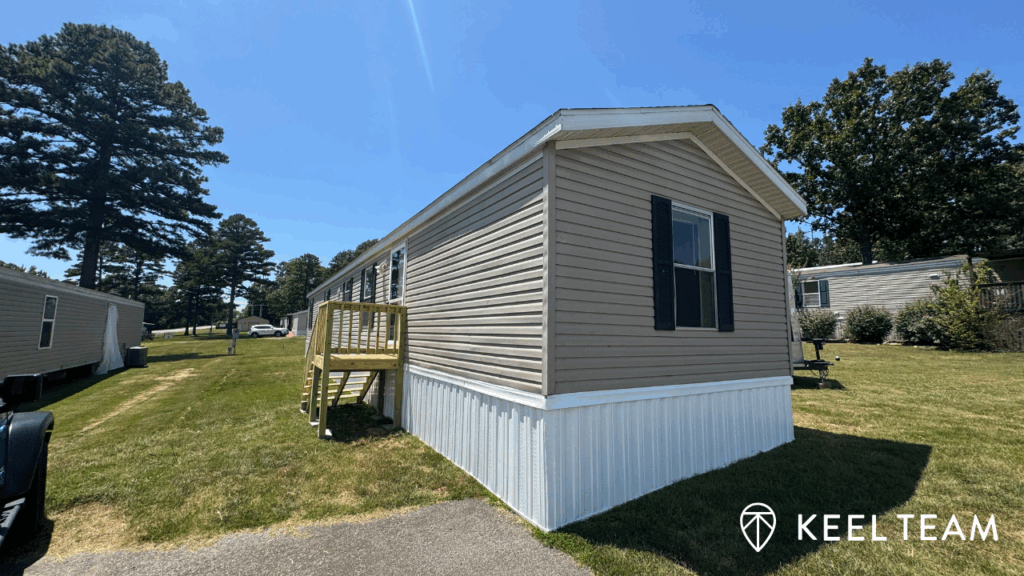How Mobile Home Park Syndications Work for Passive Investors
-
 Tristan Hunter - Investor Relations
Tristan Hunter - Investor Relations

Passive investing in real estate continues to grow in popularity, and mobile home park syndications are becoming a preferred choice for many investors seeking diversification. These syndications typically allow individuals to participate in the ownership of mobile home parks without needing to manage tenants, contractors, or day-to-day operations. Instead, experienced operators handle the complexities (generally), while passive investors contribute capital and share in the potential financial outcomes. In this article, we’ll explore how mobile home park syndications work, the roles involved, the investment process, and what passive investors should consider before participating.
What Is a Mobile Home Park Syndication?
A mobile home park syndication is a partnership structure where multiple investors pool their money to acquire and operate a mobile home park. In most cases, a professional operator—often referred to as the “sponsor” or “general partner”—leads the deal. Passive investors, also known as “limited partners,” provide capital and receive a share of potential returns.
This structure makes it possible for individuals to access larger, professionally managed mobile home park investments that they might not be able to pursue on their own. Instead of shouldering the responsibilities of sourcing, managing, and improving the property, passive investors rely on the expertise of the sponsor team.
Download our FREE eBook on the Top 10 things to know BEFORE investing PASSIVELY in mobile home parks!
Why Mobile Home Parks Attract Passive Investors
Mobile home parks occupy a unique niche in the real estate market. They often serve as one of the last forms of non-subsidized affordable housing, which means demand tends to remain consistent even during economic downturns. While every investment carries risks, this consistency has drawn many investors toward mobile home park syndications.
Some common reasons investors consider this asset class include:
- Affordable housing demand: Rising housing costs in many regions have increased the need for affordable housing options like mobile home parks.
- Limited supply: Zoning restrictions and community pushback often limit new mobile home park development, which can make existing communities more valuable over time.
- Professional management: Syndications allow passive investors to benefit from professional operators who specialize in optimizing occupancy, managing expenses, and executing value-add strategies.
While these factors are attractive, investors should always remember that outcomes vary and no investment is guaranteed.
The Structure of a Mobile Home Park Syndication
To understand how syndications work, it helps to break down the roles and responsibilities of the parties involved.
The General Partner (Sponsor)
The general partner is responsible for finding the deal, conducting due diligence, arranging financing, and managing the property after acquisition. Sponsors often contribute their own capital, but their primary role is to execute the business plan and oversee operations.
The Limited Partners (Passive Investors)
Limited partners invest capital into the syndication. They are not involved in day-to-day operations but instead rely on the general partner’s expertise. In exchange, limited partners receive a share of the profits, typically distributed through preferred returns, profit splits, or other structures outlined in the offering documents.
The Property Itself
The mobile home park serves as the central asset. The value of the investment comes from rental income generated by tenant lot rents and, in some cases, from additional sources such as utility bill-backs, storage units, or community amenities.
The Investment Process: Step by Step
For passive investors, the syndication process usually follows a clear path. Understanding each step helps build confidence in how the investment is structured.
1. Sourcing the Deal
The general partner identifies a mobile home park that fits their investment criteria. This involves analyzing market demand, reviewing financial performance, and considering potential improvements.
2. Creating the Offering
Once a deal is under contract, the sponsor prepares offering materials such as a Private Placement Memorandum (PPM), business plan, and financial projections. These documents explain the risks, structure, and goals of the investment.
3. Raising Capital
Passive investors are invited to participate, typically through Regulation D offerings (such as 506(b) or 506(c) exemptions). Investors review the materials, ask questions, and, if comfortable, commit capital.
4. Closing on the Property
After raising sufficient funds, the sponsor finalizes financing with lenders, closes on the mobile home park, and assumes operational control.
5. Executing the Business Plan
The sponsor implements the planned improvements—whether that includes filling vacant lots with homes, repairing infrastructure, or enhancing management practices.
6. Distributing Returns
As the property generates income, passive investors may receive distributions, usually quarterly. The timing and amount depend on actual performance and the syndication’s structure.
7. Exit Strategy
Eventually, the sponsor may refinance or sell the property. When this occurs, investors typically receive their initial investment back along with a share of any profits from the sale.
How Passive Investors Get Paid
The exact way passive investors receive income depends on the syndication structure, but several methods are common.
Preferred Returns
Some syndications offer a “preferred return,” which means limited partners receive a set percentage of profits before the general partner participates in profit sharing. For example, if the preferred return is 7%, investors would receive distributions up to that amount before profits are split further.
Profit Splits
After preferred returns are met, profits are usually divided between the general and limited partners according to a predetermined ratio. For example, an 80/20 split would allocate 80% of profits to passive investors and 20% to the sponsor.
Capital Appreciation
When the mobile home park is sold, investors often receive their original capital plus a portion of the appreciation. This can significantly influence overall returns, though the exact outcome depends on market conditions and execution of the business plan.

What Passive Investors Should Evaluate
While mobile home park syndications provide opportunities, passive investors should carefully evaluate each deal before committing. Key considerations include:
The Sponsor’s Track Record
Since sponsors manage all aspects of the investment, their experience and track record are crucial. Investors often review past performance, management style, and communication practices.
The Market
The location of the mobile home park matters. Factors like local demand for affordable housing, employment opportunities, and population trends can influence performance.
The Business Plan
Understanding how the sponsor plans to improve and manage the mobile home park is essential. Investors should assess whether the strategies seem realistic given the property and market.
Legal and Financial Documents
The PPM, subscription agreement, and operating agreement outline the terms of the investment. These documents describe investor rights, distribution structures, and risks.
Risks to Keep in Mind
Every investment carries risk, and mobile home park syndications are no exception. Some potential risks include:
- Economic shifts: Job losses or declining demand in a market could affect occupancy and rental income.
- Operational challenges: Filling vacant lots, managing infrastructure, and handling tenant relations all carry uncertainty.
- Financing risks: Interest rate changes and lender requirements can impact performance.
- Liquidity constraints: Syndications are typically long-term and illiquid, meaning investors may not be able to access their capital until the property is sold or refinanced.
Understanding these risks is essential for any passive investor considering a mobile home park syndication.
The Appeal of Passive Investing in Mobile Home Parks
For many investors, the appeal of mobile home park syndications lies in their ability to combine professional management with access to a stable asset class. By participating passively, investors can diversify their portfolios without taking on the responsibilities of being a landlord. Instead, they can rely on experienced operators who specialize in this niche sector of real estate.
Of course, results vary and no investment is without uncertainty. However, the structure of syndications provides a clear pathway for individuals who want exposure to mobile home parks while maintaining a passive role.
Final Thoughts
Mobile home park syndications provide passive investors with an opportunity to participate in a unique real estate asset class that continues to draw interest due to its ties to affordable housing. By pooling capital with other investors and partnering with experienced sponsors, individuals can gain access to professional management, potential cash flow, and long-term growth strategies.
That said, every investor should perform due diligence, review offering documents carefully, and understand the risks involved. While many find mobile home park syndications an appealing way to diversify, it is important to approach each opportunity with a clear understanding that results are never guaranteed.
Are you looking for MORE information? Book a 1-on-1 consultation with Andrew Keel to discuss:
- A mobile home park deal review
- Due diligence questions
- How to raise capital from investors
- Mistakes to avoid, and more!
Disclaimer:
The information provided is for informational purposes only and is not investment advice or a guarantee of any kind. We do not guarantee profitability. Make investment decisions based on your research and consult registered financial and legal professionals. We are not registered financial or legal professionals and do not provide personalized investment recommendations.

Tristan Hunter - Investor Relations
View The Previous or Next Post
Subscribe Below 👇





